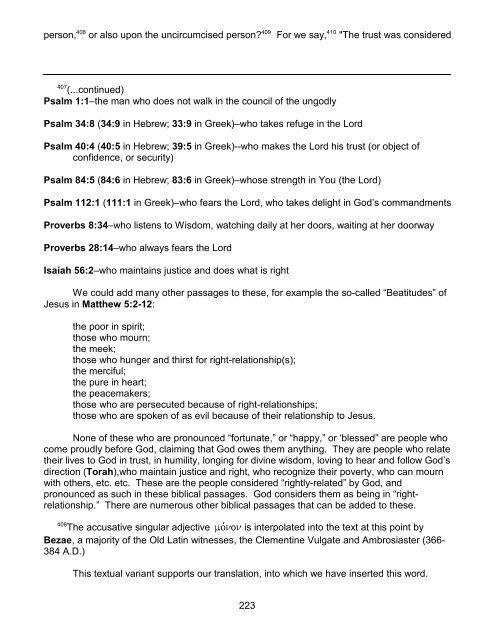408 409 410person, or also upon the uncircumcised person? For we say, "The trust was considered407(...continued)Psalm 1:1–the man who does not walk in the council of the ungodlyPsalm 34:8 (34:9 in Hebrew; 33:9 in Greek)–who takes refuge in the LordPsalm 40:4 (40:5 in Hebrew; 39:5 in Greek)--who makes the Lord his trust (or object ofconfidence, or security)Psalm 84:5 (84:6 in Hebrew; 83:6 in Greek)–whose strength in You (the Lord)Psalm 112:1 (111:1 in Greek)–who fears the Lord, who takes delight in God’s commandmentsProverbs 8:34–who listens to Wisdom, watching daily at her doors, waiting at her doorwayProverbs 28:14–who always fears the LordIsaiah 56:2–who maintains justice and does what is rightWe could add many other passages to these, for example the so-called “Beatitudes” ofJesus in Matthew 5:2-12:the poor in spirit;those who mourn;the meek;those who hunger and thirst for right-relationship(s);the merciful;the pure in heart;the peacemakers;those who are persecuted because of right-relationships;those who are spoken of as evil because of their relationship to Jesus.None of these who are pronounced “fortunate,” or “happy,” or ‘blessed” are people whocome proudly before God, claiming that God owes them anything. They are people who relatetheir lives to God in trust, in humility, longing for divine wisdom, loving to hear and follow God’sdirection (Torah),who maintain justice and right, who recognize their poverty, who can mournwith others, etc. etc. These are the people considered “rightly-related” by God, andpronounced as such in these biblical passages. God considers them as being in “rightrelationship.”There are numerous other biblical passages that can be added to these.408The accusative singular adjective mo,non is interpolated into the text at this point byBezae, a majority of the Old Latin witnesses, the Clementine Vulgate and Ambrosiaster (366-384 A.D.)This textual variant supports our translation, into which we have inserted this word.223
411in Abraham as a right-relationship."412 413 4144.10 <strong>In</strong> what way, therefore was it considered? While being circumcised, or not415 416circumcised? Not while circumcised, but rather, while not circumcised! 4.11 And he409Literally, the Greek text asks, "Is it pronounced upon the circumcision, or also upon theforeskin?", meaning, “upon the Jews, or also upon the non-Jews?”410Following the phrase le,gomen ga,r, “for we say,” the conjunction o`,ti, “that,” isinterpolated into the text by Alexandrinus, Ephraemi Rescriptus, a corrector of Bezae, F, G,Psi, Minuscule 33 and the “Majority Text.”The text without this conjunction is read by Sinaiticus, Vaticanus, the first writer ofBezae, Minuscules 630, 1739, 1881 and a few other Greek manuscripts.Whether read or not makes no difference for the meaning of <strong>Romans</strong>.Kaesemann translates this opening phrase by "For we quoted:..."411Here Paul has paraphrased Genesis 15:6, the passage earlier quoted almost verbatimin verse three.412The interrogative particle pw/j ordinarily means simply "How?," or "<strong>In</strong> what way?"Cranfield renders it here by "<strong>In</strong> what circumstances...?"413Here again, Paul’s questioning continues, seeking to get the reader to think with him, andseek to give an answer to his question.414Literally, "...When he was being circumcised...", or "...When he was in a state ofcircumcision..." The question is intended to cause the reader to turn to Genesis, and considerthe condition of Abraham when the statement was made that he was considered as being in“right relationship” with YHWH. Did that statement come before or after his circumcision?415Literally, "...Or in foreskin ( = uncircumcision)."416The story of Abraham's circumcision occurs in Genesis 17, some time later than thestory in Genesis 15, where the statement is made concerning Abraham's trust beingconsidered by YHWH as a right-relationship with himself. This is very important for Paul'sargument. Abraham didn't have to first get himself and all the males in his larger familycircumcised, in order to get in right-relationship with YHWH. Rather, when Abraham placedtrust in the divine word of command and promise, YHWH God considered that as "a rightrelationship"--andit was only a long time later that Abraham entered into the covenant ofcircumcision.Moo comments that Paul’s answer to his question is “clear and direct: ‘It was not whenhe was circumcised but when he was uncircumcised’...Paul has in mind the chronologicalprogression of the Genesis narrative about Abraham...It is not until much later–twenty-nineyears, according to the rabbis–that he is circumcised (Genesis 17).” (P. 268)224
















